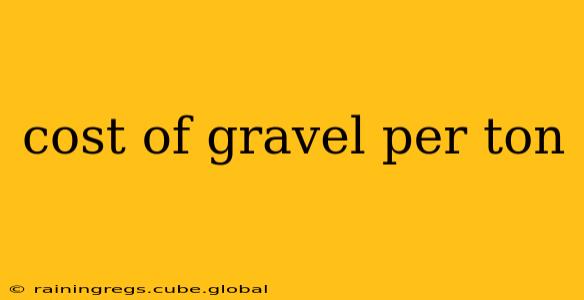The cost of gravel per ton varies significantly depending on several factors. Understanding these factors is crucial for anyone planning a landscaping project, driveway construction, or any other endeavor requiring gravel. This comprehensive guide will break down the price influences and provide you with a better understanding of what to expect.
What Factors Influence the Price of Gravel Per Ton?
Several key factors contribute to the fluctuating cost of gravel per ton:
-
Type of Gravel: The most significant factor is the type of gravel you choose. Different gravels have different properties and origins, impacting their cost. For example, river rock, often visually appealing, tends to be more expensive than crushed gravel, which is typically more economical. Other types, like pea gravel or decorative gravels with unique colors or textures, will also influence pricing.
-
Location: Geographic location plays a substantial role. Transportation costs are a major component of the overall price. Areas further from gravel quarries or processing plants will naturally experience higher prices due to increased fuel and logistical expenses.
-
Quantity: Bulk purchases usually result in lower per-ton costs. Buying larger quantities often comes with discounts, making it more cost-effective for large-scale projects.
-
Supply and Demand: Like any commodity, gravel prices are affected by supply and demand. Periods of high demand or shortages of specific gravel types can lead to price increases.
-
Delivery Costs: The cost of delivery is often a significant addition to the price per ton. Delivery fees depend on distance, accessibility of the delivery location, and the volume of gravel being transported.
How Much Does Gravel Typically Cost Per Ton?
Providing an exact price is impossible without knowing the specific factors mentioned above. However, a general range can be helpful. You can typically expect to pay anywhere from $20 to $50 per ton for common types of gravel. However, some specialized or decorative gravels can cost significantly more.
What are the different types of gravel and their cost?
This varies by region, but generally:
- Crushed Gravel: This is often the most affordable option, typically falling within the lower end of the price range.
- River Rock: This tends to be more expensive due to its aesthetic appeal and the higher cost of sourcing and processing.
- Pea Gravel: This smaller-sized gravel is usually moderately priced.
- Decorative Gravels: These can vary dramatically in price depending on the color, size, and origin of the material. Some unique varieties can cost considerably more.
What is the cost of gravel delivery?
Delivery costs are highly variable. They depend on the distance from the quarry or supplier to your location, the quantity ordered, and accessibility to your site. Contact your supplier for a precise delivery quote. Expect to pay an additional fee per ton or a flat rate depending on the supplier and distance.
Are there ways to save money on gravel?
Yes, several strategies can help you save money on gravel:
- Buy in bulk: Large orders often result in significant discounts.
- Source locally: Reduce transportation costs by finding suppliers closer to your project site.
- Compare prices from multiple suppliers: Shopping around and comparing quotes can save you money.
- Consider alternative materials: If the aesthetic isn't paramount, explore less expensive alternatives that may still serve your project's needs.
By considering these factors and doing your research, you can make informed decisions and ensure you get the best price for your gravel needs. Remember to always get multiple quotes from different suppliers to compare pricing and delivery options.
